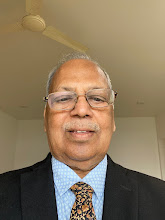IIM Bill
Dr. T. V. Rao is member
of the IIMA Society and also Board of Governors of IIMA. He taught at IIMA for
around 40 years. The views here are his personal views as a citizen and experienced professor and don’t represent any role he performs.
The draft IIM Bill that is under consideration has many
good aspects but falls short of innovative and imaginative structure and fails
to make use of the success experiences of the IIMs of excellence like IIMA, B
and C. It attempts to group all IIMs in one basket, with the prospect of making IIMs like the IITs. This will lead to disaster in future as indicated in a recent article that appeared in TOI on “China Rising India
Falling” (See TOI, 6th January, 2015: http://blogs.timesofindia.indiatimes.com/toi-edit-page/china-rising-india-falling-iits-are-an-illustrative-example-of-the-dumbing-down-of-indian-universities/). I will mention a few points here while not undermining the significance of the new bill in giving degree granting status to IIMs and making them Institutions of National Importance.
Imagine an entrepreneurial CM like Chandra Babu Naidu taking
it on himself to make the new IIMAP an Institution of excellence with innovative management
structure. He could simply borrow the IIMA model where Dr Sarabhai, Jivaraj Mehta
the then CM of Gujarat and local Industrialists together made it a world class
Institution of excellence. If advised
properly Mr. Naidu could easily mobilise with his charisma, the local and National
Industry to form an IIMAP Society on the patterns of IIMA Society and get them to
participate in the building of IIMAP. What an institution like IIMAP requires
in the initial stages is good placement (summer and final) opportunities
besides funding, infrastructure support,
faculty and Good Board. In starting of IIMA,
the IIMA Society played a very significant role in giving and getting financial and placement support and
also lending governance support. Mr. Naidu will do well in mobilising a hundred
Industry leaders to become members of
the IIMAP Society and participate in
building an institution of excellence. Such people who have established
themselves in India itself, in other countries and have interest in AP could be
made members of this society and invited to participate in the structure and functioning
of the Institute. The IIMAP Society members could consist of Industrialists, NRAs,
NRTs (Non-resident Andhras or NRTs Non
resident Telugus or Non resident
Telenganaites etc. ), Business leaders, Professors and prominent Alumni of other
IIMs, and the Government of AP. The Society can remain as an Advisory Board to
the Governing council as the proposed in the new Bill but be given some more responsibility and teeth. With minor modification in the bill this can be achieved. In fact the MHRD should have been imaginative
in strengthening the Societies of IIMs and given a them a significant role with
the expectation a that every IIM in a 10 to 15 year period should become self sufficient
in funding and should exist on its own self sufficiency. The way the Societies worked in at least a few of the older IIMs could be taken as an example than to write them off - since they have not taken off in the new IIMs. A wiser step would be to build other societies than to kill them using wrong examples. The bill could pass part of the fund mobilization, placement, relevant specializations that help serve local and national interests etc. responsibilities to the Society and the Board and thus reduce dependence of
IIMs on public funds. In most states where new IIMs are established there are new Governments and they could effectively use IIMs to serve their governance purposes also. For example the graduating students of IIMAP could assist Mr. Naidu in building his dream state of AP. They get placement and lots of challenges and AP gets professional managers from IIMs. Instead of taking a development approach to
managing IIMs the bill takes a controlling approach. This might help MHRD to have control
over the IIMs now but take away the responsibility or building IIMs that have local relevance and particpation which the Societies can alone help in achieving. It would also fit in well into the new Governance mantras of Shri Modi Government. So far the IIM Registered
Societies have taken to support IIMs in many ways in a few of the early set up
IIMs that achieved excellence.
Chief Ministers like Mr.
Naidu should have their way, and should be able to use the new IIMs through constitution
of Societies like IIMAP Society involving
local and national level industry and other GOs and NGOs.. They become
potential employers of IIMAP students, and even the Institute can be directed
to offer courses that will make large number of IIMAP graduates to participate
in the reconstruction of the new State of Andhra Pradesh of the dreams of Mr. Naidu.
In fact the MHRD will do well in reconsidering their stand on the role of
Societies. The current bill practically kills the Societies and marginalises their role. The bill provides for the
existing Societies to give upto three Board members to the Governing Board and
act as an Advisory Body at the discretion of the respective Boards. A wiser
move would have been to insist on all IIMs to have strong stronger Societies
and advisory Boards involving local industry and alumni and work for financial
self sufficiency and employment opportunities. The societies also can ensure IIMs to conduct relevant
research and serve the national interests better. We don’t need all IIMs to
compete in Global Ranking and conduct research that is more
relevant to secure tenure positions in the US and less relevant to resolving local issues
and nation building.

No comments:
Post a Comment